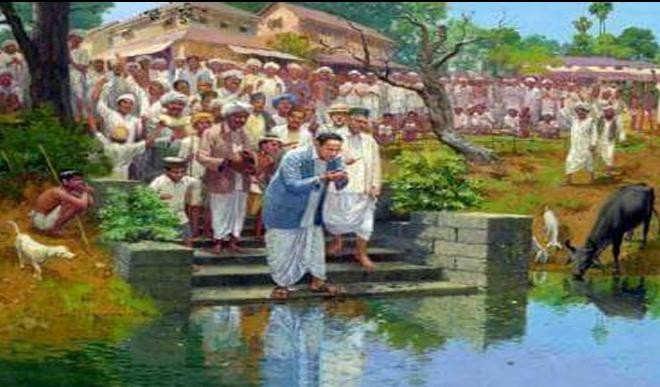
Mahad Satyagraha: First Revolt for Right to Water
It was hot summer of 2016, in the drought-hit village of Vidarbha, Washim district, a Dalit man named Bapurao Tajne had to dig own well in order to fulfil the need of WATER for his family. Bapurao Tajne had no option but to spent 40 days digging a well after his wife attempted to draw water from the well of someone of a higher caste and was denied — and humiliated. Tajne is a poor labourer, and could not quit his job to dig the well, so he would wake up early and dig for four hours before work and then shovel for another two once he got home.
According to The Office of the High Commissioner for Human Rights (OHCHR), the United Nations Human Settlement Programme (UN-Habitat) and the WHO issued a fact sheet on the Right to Water “Water is the essence of life. Safe drinking water and sanitation are indispensable to sustain life and health, and fundamental to the dignity of all.” If this is the case then what about the dignity of the wife of Tajne? If ‘water is the essence of life’ then why no one but a wife of a Dalit man was denied water? Does the life of a Dalit is less in comparison to any other human?
On this day March 20, in 1927 Dr B R Ambedkar led the Mahad satyagraha –for ‘Untouchables’ for claiming the right on fetching water from the Cavdar (public) tank at Mahad. Dr Ambedkar and his co-workers led a procession of 2,500 “untouchables” through main streets towards the Chavdar tank. Dr.
Ambedkar took water from the tank and drank it. Others followed suit. Then everybody returned to the pandal. It was a peaceful protest. It is necessary to mention Dr Ambedkar’s argument here, “It is not simply for drinking water; drinking the water will not give us very much. It is not even a matter of only of our human rights, though we fight to establish the right to drink water. But our goal is no less than that of the French Revolution. This was fought for the reconstruction of society, for the eradication of the old society based on feudal inequality and the establishment of a new society based on liberty, equality, and fraternity.” He goes on to express the goal of this Satyagraha “Similarly, we want to end the old inhuman caste society based on inequality and reconstruct the world, reconstruct society on the basis of liberty, equality, and fraternity. This is our goal!”
Hindu Shastras divide Hindu religion into four Varnas- Bramhin, Kshatriya, Vaishya and Shudras. The section of society which was/is outside of this Varna system is the Untouchables (Ati-Shudras). This section of society had no civil, social rights. The practice of untouchability was not limited to inter personal interaction but was also extended to the public spaces. ‘Untouchables’ were not allowed to enter temples, not allowed to collect water from public water sources, they had to find different water source to collect water. To challenge this inhuman oppressing system and to claim equal human rights for ‘Untouchables’ Dr Ambedkar had to do Mahad Satyagraha.
After nearly 70 years of the independence, and nearly 90 years of Mahad Satyagraha, Tajne had to this, dig well to get water for his family. The society and the oppressing system, to be precise- the caste system, is still very much effective in oppressing this marginalised section of the society, ‘Dalits’. The rising atrocities on Dalits, Dalit women can explain it. Every day on social media I find news of somewhere somebody getting assaulted because of his/her caste. I feel it is traumatising for a Dalit like me to be on social media. When I talked to my ‘Dalit’ (Ambedkarites) friends on social media, they share the same feeling as I do. They find it hard to express and assert their identity; most of them choose to remain anonymous on such social platforms.
Today, after 93 years of Mahad Satyagraha, the goal Mahad Satyagraha and the arguments Dr Ambedkar put forth on 19th march 1927 in Depressed Classes Conference, are still so relevant today for the society we live in. On this day, let us read and understand what Dr Ambedkar said and work for the cause of establishing Ambedkar’s ideal society based on liberty, equality, and fraternity. Let us work for that Revolution!
Author – Prashant Bhaware



+ There are no comments
Add yours